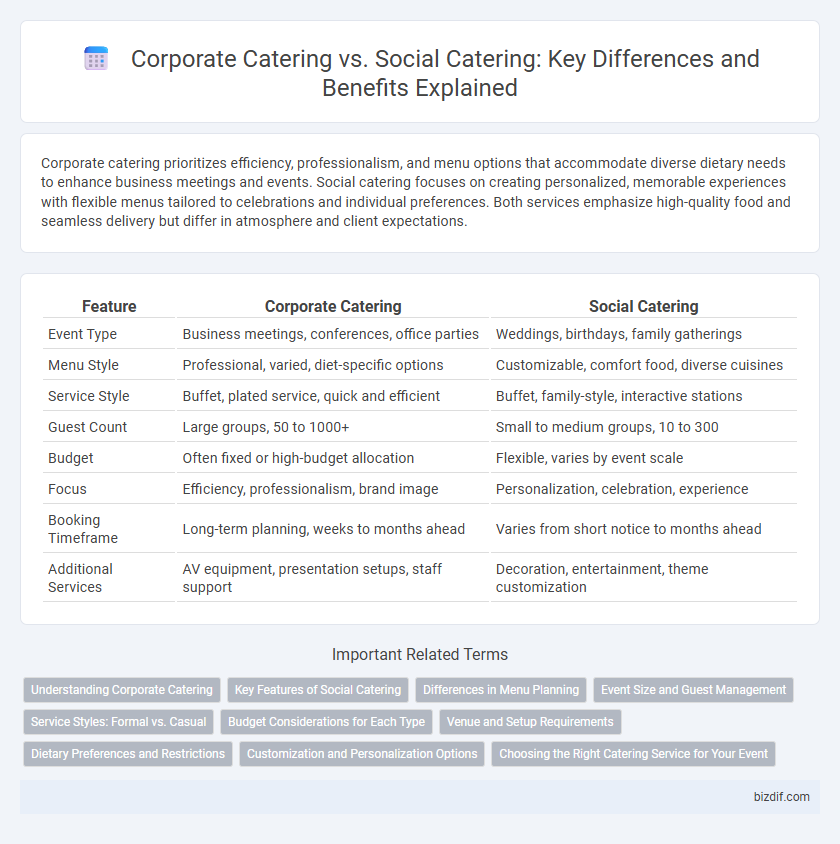Corporate catering prioritizes efficiency, professionalism, and menu options that accommodate diverse dietary needs to enhance business meetings and events. Social catering focuses on creating personalized, memorable experiences with flexible menus tailored to celebrations and individual preferences. Both services emphasize high-quality food and seamless delivery but differ in atmosphere and client expectations.
Table of Comparison
| Feature | Corporate Catering | Social Catering |
|---|---|---|
| Event Type | Business meetings, conferences, office parties | Weddings, birthdays, family gatherings |
| Menu Style | Professional, varied, diet-specific options | Customizable, comfort food, diverse cuisines |
| Service Style | Buffet, plated service, quick and efficient | Buffet, family-style, interactive stations |
| Guest Count | Large groups, 50 to 1000+ | Small to medium groups, 10 to 300 |
| Budget | Often fixed or high-budget allocation | Flexible, varies by event scale |
| Focus | Efficiency, professionalism, brand image | Personalization, celebration, experience |
| Booking Timeframe | Long-term planning, weeks to months ahead | Varies from short notice to months ahead |
| Additional Services | AV equipment, presentation setups, staff support | Decoration, entertainment, theme customization |
Understanding Corporate Catering
Corporate catering specializes in providing tailored meal solutions for business events, conferences, and office meetings, emphasizing efficiency, professionalism, and dietary accommodations. Services often include boxed lunches, buffet setups, and grab-and-go options designed to fit tight schedules and diverse preferences. Key factors for successful corporate catering include menu customization, punctual delivery, and adherence to health and safety standards.
Key Features of Social Catering
Social catering specializes in creating personalized menus tailored to events like weddings, birthdays, and family gatherings, emphasizing customization and guest preferences. It often includes interactive food stations, diverse cuisine options, and flexible service styles, such as buffet, plated, or family-style dining. The focus lies on creating memorable experiences with attention to presentation, dietary restrictions, and festive ambiance.
Differences in Menu Planning
Corporate catering menus prioritize efficiency and dietary accommodations, often featuring grab-and-go options, boxed lunches, and customizable meal plans tailored to professional settings and diverse workplace preferences. Social catering menus emphasize variety and presentation, offering elaborate dishes and themed assortments to suit celebrations, personal tastes, and event atmospheres. Menu planning for corporate events typically incorporates time constraints and nutrition balance, while social catering prioritizes aesthetic appeal and guest experience through diverse, immersive culinary offerings.
Event Size and Guest Management
Corporate catering often handles larger event sizes with complex guest management requirements, including precise headcounts, dietary restrictions, and professional presentation standards. Social catering typically serves smaller, more intimate gatherings where personalized menus and flexible guest interactions are prioritized. Efficient guest management systems in corporate settings ensure smooth service flow, while social events focus on creating a welcoming atmosphere tailored to individual preferences.
Service Styles: Formal vs. Casual
Corporate catering often emphasizes formal service styles such as plated dinners or buffet presentations with professional staff to maintain a polished, businesslike atmosphere. Social catering typically features more casual service options like family-style meals, food stations, or self-serve buffets that encourage relaxed interaction among guests. The choice between formal and casual service styles directly impacts the event's tone, guest experience, and logistical needs.
Budget Considerations for Each Type
Corporate catering often requires strict budget management to accommodate larger groups and recurring events, emphasizing cost-effective menu planning that aligns with professional standards. Social catering budgets typically vary widely, influenced by the event's scale, personalization preferences, and the inclusion of premium services or specialty dishes. Understanding the distinct budget frameworks helps caterers tailor cost strategies for corporate consistency versus social event customization.
Venue and Setup Requirements
Corporate catering often requires a professional, structured venue setup with presentation-ready spaces and technological support for meetings, emphasizing efficiency and formality. Social catering focuses on flexible, informal venues like homes or outdoor spaces that prioritize comfort and social interaction, with adaptable setups to accommodate varied guest needs. Proper setup in both scenarios ensures smooth service flow, but corporate events typically demand precise timing and layout coordination to align with business objectives.
Dietary Preferences and Restrictions
Corporate catering often requires accommodating diverse dietary preferences and restrictions such as gluten-free, vegan, and low-carb options to meet employees' nutritional needs and promote workplace wellness. Social catering, on the other hand, tends to prioritize personalized menus that reflect cultural traditions and individual tastes, including allergen-free and kosher choices tailored to the event's guest list. Both catering types benefit from clearly labeling ingredients and offering customizable meals to ensure inclusivity and satisfaction.
Customization and Personalization Options
Corporate catering offers tailored menus designed to align with professional themes, dietary restrictions, and brand preferences, ensuring a seamless integration with business events. Social catering emphasizes personalized experiences by accommodating individual tastes, cultural traditions, and special occasions, enhancing guest satisfaction and event uniqueness. Both sectors prioritize customization but differ in approach, with corporate catering focusing on efficiency and branding, while social catering centers on emotional connection and creativity.
Choosing the Right Catering Service for Your Event
Corporate catering requires efficient service, professional presentation, and menu options that accommodate dietary restrictions and diverse tastes, ensuring a seamless experience for business meetings or conferences. Social catering focuses on creating a warm, personalized atmosphere with customizable menus that reflect the event's theme and guest preferences, ideal for weddings, parties, and family gatherings. Evaluating factors like event size, formality, budget, and specific requirements helps in selecting the right catering service to elevate the overall guest experience.
Corporate catering vs Social catering Infographic

 bizdif.com
bizdif.com